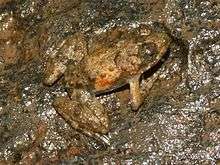Phrynobatrachus calcaratus
| Phrynobatrachus calcaratus | |
|---|---|
 | |
| Scientific classification | |
| Kingdom: | Animalia |
| Phylum: | Chordata |
| Class: | Amphibia |
| Order: | Anura |
| Family: | Phrynobatrachidae |
| Genus: | Phrynobatrachus |
| Species: | P. calcaratus |
| Binomial name | |
| Phrynobatrachus calcaratus (Peters, 1863) | |
Phrynobatrachus calcaratus, the Boutry River frog, is a species of frog in the Phrynobatrachidae family. It is found in Cameroon, Central African Republic, Ivory Coast, Equatorial Guinea, Ghana, Guinea, Liberia, Nigeria, Senegal, possibly Benin, possibly Democratic Republic of the Congo, possibly Gambia, possibly Guinea-Bissau, possibly Mali, possibly Sierra Leone, and possibly Togo. Its natural habitats are subtropical or tropical moist lowland forests, subtropical or tropical moist montane forests, rivers, intermittent freshwater marshes, and heavily degraded former forest. It is threatened by habitat loss.
Description
The Boutry River frog is a small frog with a rounded snout and a moderately warty skin, growing to a snout-to-vent length of about 11 to 19 mm (0.4 to 0.7 in) for males and 16 to 23 mm (0.6 to 0.9 in) for females. The digits do not have enlarged tips and the fingers and toes are largely unwebbed. Most animals have a uniformly coloured greenish or brownish dorsal surface, slightly darker around the warts, and a whitish belly, but some have a spinal band of red with yellowish borders and a few have a red transverse band. The male has a prominent black vocal sac on the throat during the breeding season.[2]
Behaviour
The Boutry River frog inhabits gallery forests, secondary forests, bushy regions and unburned savannah. It is a terrestrial species and is active by day and night. The diet mainly consists of ants. The males call near suitable waterbodies and the females lay clutches of a few hundred eggs which hatch in three days. Tadpole growth is fast and the animals become mature at four to five months. They have a short lifespan and probably die within a few months of spawning.[2]
Status
The Boutry River frog is listed by the IUCN as being of "Least Concern" as it is an adaptable species with a very wide range and its numbers appear to be stable.[1]
References
- 1 2 IUCN SSC Amphibian Specialist Group (2009). "Phrynobatrachus calcaratus". IUCN Red List of Threatened Species. Version 2013.1. International Union for Conservation of Nature. Retrieved 2013-12-22.
- 1 2 M.O. Roedel (2002-01-12). "Phrynobatrachus calcaratus". AmphibiaWeb. Retrieved 2013-12-22.
| Wikimedia Commons has media related to Phrynobatrachus calcaratus. |
